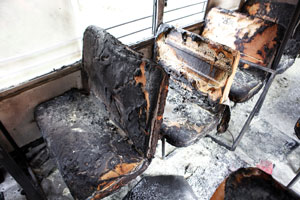 BIKRAM RAI |
Student unions of various hues have always used the glaring disparity in Nepal's education sector and the unregulated over-commercialisation of schools and colleges as an excuse to extort cash to fund their mother parties. This act is sanctioned by the establishment, and it is regarded as an acceptable fundraising method.
It is the political culture they have been schooled in. Ever since the Panchayat days when political parties were banned and student unions acted as their proxies, students have been the militant vanguards of their parties. The Maoists only honed this into a fine art by making schools a recruitment centre, training ground, and a fertile source of funds for their revolution.
Now that a faction of the Maoist party has broken off and can't purloin the treasury anymore, it resorts to vandalism, arson and terror of schools as fundraisers. It is a time-tested method and works brilliantly.
The reason schools are targeted is simple. They alone have the cash this time of year just after admissions, when all other businesses are struggling because they have been bled dry by extortion, political uncertainty, militant labour and power outages.
The hoodlums masquerading as students who destroyed computers in colleges in Kathmandu this week will in most likelihood be members of a future parliament (if we have one). The arsonists who torched school buses in Lalitpur and Chitwan may well be ministers 20 years down the line. People who blame the old guard in the political parties for letting the country down and pin their hopes in the next generation have a huge surprise in store.
What is outrageous is the lack of outrage at schools being targeted. We mince words and try to justify the attacks, blaming it on the frustration of jobless youth when it is plain this is about extraction and extortion. Just think about it, these are school buses not armoured personnel carriers or riot trucks that are being set on fire. Only cowards use terror against buses carrying children.
It's not just schools. Hospitals are regularly vandalised and doctors and nurses in Dharan, Chitwan and Pokhara are physically assaulted. Police often step in to fire tear gas into hospital premises. Yet there is the same silence from commentators and the public. Terrorism thrives in this silence.
Setting fire to school buses is a crime, vandalising a hospital is a crime, and the silence encourages criminals in the garb of politicians to justify what they do. They have our blessings, they know they are immune and people are powerless.
This impunity obviously thrives because of a weak state, there is no fear of punishment. It's the media's responsibility to highlight the wrongdoing, but when reporters and commentators do take notice, they treat it like an isolated incident. By trying to be 'balanced' and 'neutral' in its coverage the media equates the victims with criminals, legitimising the use of terror and justifying impunity.
This cycle has been repeated so often, the public has been de-sensitised and has come to accept terror, extortion, intimidation and vandalism as the norm. When the known murderersof Ujjan Shresthas, Arjun Lamas and Maina Sunars walk around in broad daylight, become ministers, are promoted or share the podium with the prime minister, criminals down the line get the message.
Our dubious moral standards, and elastic ethics, have become part of the problem. Criminals roam free because our leaders are comfortable with the use of violence as a political tool, and so are we. When a large number of people, including those in power believe violence is an appropriate form of response, this uncritical mass reaches the tipping point.
During the start of the Maoist war, when the Maoists began to carry out political assassinations, many people supported the killings, applauding the guerrillas for eliminating 'class enemies'. When the end justifies the means, anything is justified.
Our values are tainted by ideologies long considered obsolete elsewhere. We support state harassment of businesses, local opposition to infrastructure projects, militant unions on extortion sprees because the profit motive is considered evil. This spooks the few investors who are still here.
Perhaps we should bring the discussion back to the public sphere. When people are more aware of their rights and responsibilities, when they are clear about the core values they strive to protect, when they begin to understand that the state derives power from us the people, and not the other way round and that it is people who are indispensable and not the government, they will be able to assert their rights and protect their freedoms better.
Read also:
Responsibility to protect
Anger management, ANURAG ACHARYA
Attacks on private schools are a manifestation of the class divide in education



